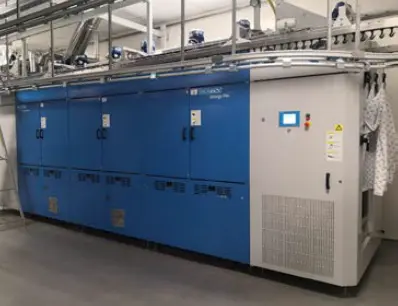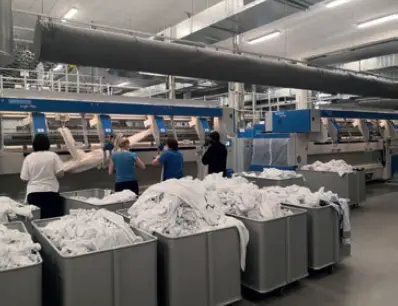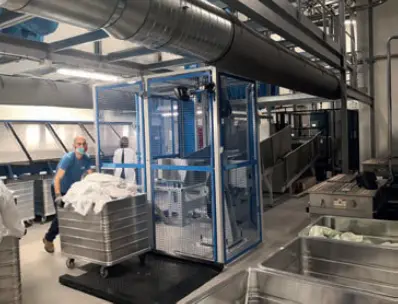
The Spanish laundry and drycleaning sector is demonstrating positive dynamics this year, thanks to the improving Spanish economy and stable demand for the most of industry’s services. While the pandemic and energy crisis in Europe had a negative impact on the industry, as of now it has almost completely recovered from their negative consequences, showing good growth rates, which is observed from the Madrid to Spain’s richest province, Catalonia.

The capitol city of Madrid and its agglomeration has always been positioned as one of the centres of laundry and drycleaning business, which is also due to a high level of economic development in the region and the high number of tourists – the main driver of growth of the industry in Spain. Despite the closure of many laundries in this region during 2020-2022, in recent years the economic situation has significantly improved.
Ana Isabel Peña Rocha, project director of the Professional Association of Dry Cleaners and Laundry of Madrid (ASTYLCAM) comments: “After 2020, the year of the [appearance of the] Coronavirus pandemic, many drycleaners and laundries closed. However, once the effects of Coronavirus on a social and economic level have passed, in Spain, the laundry and drycleaning sector has experienced a great moment, as all the events and tourist activities that had previously been canceled or paralysed were held. Furthermore, the Coronavirus effect created a greater awareness among the population about washing their clothes and household items, since at the beginning of the crisis, our business was considered by the Spanish government as an essential service for society. And since there were fewer drycleaners on the market, there was more work to distribute.’

According to Peña Rocha, despite some successes, in recent years the development of the industry has been heterogeneous, being largely depending on geographical areas. “In Spain in general, the drycleaning and laundry business has decreased in recent years: the clothes sold are increasingly of poorer quality and cheaper, so they are not taken to the drycleaners. In offices, a suit is not required as in the past; There are fewer specialist personnel and new generations prefer to work in the digital sector, so dyers retire and there is no generational change. However, in regions such as the Community of Madrid, due to its policies, the impact is less than in the rest of Spain, although they are experiencing the same problems. Furthermore, Madrid, unlike the rest of Spain, has the professional association, ASTYLCAM, fully dedicated to helping, advising and managing any matter that may affect the sector. In fact, during the pandemic, the dry cleaning and laundry sector of the Community of Madrid was the one that suffered the least from the crisis, due to the great work.
“While the Community of Madrid has always been the economic engine of Spain, in recent years it has experienced a huge economic boom, with a special increase in the tourism sector. This has led to an increase in work in our sector, especially in laundry, which has caused a large increase in laundry openings,” says Peña Rocha.

The Spanish laundry and drycleaning sector has always been of interest to global major players, many of which have significantly strengthened their positions in this market in recent years. One example is Kannegiesser, as its sales director André Tienemann explains how 2023 and early 2024 were marked by exceptional success for the company in the Spanish laundry market. “Our strong subsidiary played a key role in this achievement, allowing us to further solidify our leading position in Spain. We also made significant progress in meeting the individual needs of our customers in Spain at all. We invested in new technologies and processes to improve our efficiency and service quality. We will further strengthen our partnerships with key players in the Spanish laundry and textile care market.”
Like Peña Rocha, Tienemann recognises that the tourism industry is a major driver of current economic growth in Spain, saying that while the increasing number of tourists visiting Spain will create a greater demand for laundry services as well as the higher hygienic standards after the pandemic which impact the requirements and public tender for healthcare laundries.
“Another factor which impacts the sector is the increasing demand for laundry services related to washing and/or renting of workwear linen as such as related services. This appears with a no less stringent requirements in terms of hygiene and environmental protection from public parties. The consequences are an increase in the need for external services in the workwear market. At the same, he reckons, the laundry industry in Spain faces several challenges, including:
- The industry is struggling to find qualified workers, such as laundry attendants.
- The cost of labour in Spain is relatively high, which can make it difficult for a laundry to maintain a good revenue.
- The rising cost of energy is increasing the operating costs of laundry businesses.
- The industry is under pressure to reduce its environmental impact.
In the meantime, another global player, Alliance Laundry Systems, also considers the Spanish market to be one of the most promising for its growth, putting particular focus on the on-premise laundry (OPL) sector. Jose Gutierrez, country manager Spain/Portugal for Alliance says: “For a laundry equipment manufacturer such as ALS in Spain, the OPL market presents a prime expansion opportunity, covering the needs of businesses like hotels, hospitals, and spas seeking reliable on-site laundry solutions. As well, with a growing trend towards outsourcing laundry services, establishing partnerships with OPL operators can secure long-term contracts and consistent revenue streams. Additionally, the expanding laundromat business segment offers avenues for equipment supply to self-service laundry facilities, meeting the demand driven by urbanisation and tourism.’

Gutierrez continues: “The rise of dual-income households, the lack of free time in families drive the demand for outsourced laundry services and drycleaning.”
There are big plans for the Spanish market for another German player, namely, Miele Professional. The company says it has achieved some strong results in the market in recent years, planning further expansion. Jürgen Schäfer, Miele regional director marketing SEE HoReCa, care, self service, business unit professional, says: “The year 2023 was, and the beginning of 2024 is, for Miele Professional another very strong year in Spain or, better said, the continuous strong growth we have seen in the past years also continues in 2024. Especially within the laundry sector or more precisely in the OPL sector we are serving several different customer segments, from small boutique hotels up to large scale hotels in the highest star ratings, nursing homes and many other special customer requests.”
According to Schäfer, particular attention is also paid to self-service laundry for some sectors like student homes, flexliving and co-living environments. “They gained a huge space in the market with their in-house laundry requirements, and Miele Professional in Spain was able to achieve a very good market share working with the main big players in these areas. We triggered this market thanks to ‘appWash’ (a Miele group member), a complete digital solution able to manage your inhouse laundry for students or other kind of users. Alongside that we also offer with Bloomest – which is 100% part of the Miele Group – turn key solutions for investors within the coin laundry industry.” Schäfer adds the company continues to look for new ways for energy and water savings with its solutions and products in Spain. Schäfer hopes for a strong demand for laundry processes, especially for the in-house laundry process in 2024.

“The hotel industry is growing and Miele offers solutions which are providing hotel owners reliable high quality cleaning processes with the lowest possible environmental impact due to lowest water and energy consumption. One of the challenges now is the environmental aspect, as logistics costs are significantly increasing. Outsourcing is getting more and more expensive, whereas the in-house laundry offers here a very attractive alternative for the hotel owner – related to savings potential and not to forget having the full quality control in house for the highend linen and towels.
According to Eduard Colomer at Domus, a global laundry solutions innovator and and manufacturer based near Barcelona, the industrial laundry and drycleaning sector in Spain has experienced steady growth in recent years, driven by the demand for services from companies in various sectors, such as the hospitality industry, the healthcare industry, the textile sector and cleaning companies.
“Domus has also evolved and grown with the sector, constantly investing in technology to offer equipment and solutions that adapt to the demands of the sector, such as specific machinery for hospitals and residences, models for mops (very focused on cleaning companies for example), advanced software with connectivity to have all the traceability and control of the business and the machines, among others.
“This trend is expected to continue thanks to factors such as increased tourism activity, growing outsourcing of non-core services, and greater concern for hygiene and safety. The adoption of new technologies, such as automation and IoT, can help improve efficiency and productivity in the sector. Domus in this regard is already offering Domus Connect: the IoT free of charge in industrial washers and dryers, which facilitates analytics for good business optimisation and improve productivity and efficiency.”
However, despite the positive outlook, Colomer warns that the industrial laundry and drycleaning sector in Spain also faces some major challenges:
- Operating costs: Operating costs, such as energy, water and rent, are high and can negatively affect the profitability of the business.
- Sustainability: The sector has a significant environmental impact due to water and energy consumption. It is important that companies adopt sustainable practices to reduce their environmental footprint. In this regard, says Colomer, Domus is working on policies to reduce its footprint, and is also proving to be a pioneer for example with unique water recovery equipment in the laundry sector, which brings immediate savings to the owner and contributes to the care of the planet.
“In addition to the general challenges of the sector, industrial laundry and drycleaning companies that focus on the Horeca sector also face some specific challenges. Horeca companies require a high quality and personalised service to meet the needs of their customers.Industrial laundry and drycleaning companies must be flexible to adapt to the changing needs of their customers, such as peaks in demand during peak seasons.
At the same time, for Jensen-Group, the Spanish market is also one of the highest priority in Europe. Nicolas Gostony , head of marketing, Jensen-Group, says: “The Spanish market has been one of the most dynamic markets related to hospitality segment as our country enjoyed the visit of 85 million tourists in 2023 which is a new record. This has been a key factor to help many laundries to cope with the debts and costs related to lockdowns and travel restrictions the past years. Jensen has been growing quite considerably in the past two-to-three years thanks to the wide portfolio of solutions and to be closer to their customers, trying to listen to their needs, provide the right service and approach to each demand and requirement. It is still long way ahead to improve in many different fields but what is clear is that digitalisation, innovation and automation of many manual processes are keys for the future.”
Gostony believes that tourism will continue to be a key factor for a further growth of the local market, although also new industries and regulation will boost other segments like garments and white rooms. “Our market is impacted, but the dominant presence of two key players who have at least the 60% of the whole market means this concentration can grow and impact the natural evolution of a more atomised market. We see a growing demand of substantiality requirements in all our processes which will shape the industry in the mid-term.”
Another laundry solutions manufacturer in the Barcelona region, Girbau, also sees acceleration of expansion in the Spanish laundry sector thanks to strong results, which has been achieved by the company in the local market in recent years. Paulo Barreira, Girbau Iberia president comments: “In 2023 and early 2024, Girbau experienced significant success in Spain’s laundry and textile care market. We’ve diversified our sales by segment to better cater to our customers’ specific needs, yielding important outcomes, in the food sector, commercial and industrial laundry, while at the same time further strengthening our leadership in the hospitality, care homes and vending sector.
“Additionally, our GS7 series has been exceptionally well received by our customers, showcasing effective gains in energy efficiency and water savings associated with the innovative digital features of the GENIUS series. Drycleaning faces important challenges for growth as new processes such as wetcleaning are a growing trend, for washing efficiency and ecological/environmental reasons. As in the last two years, we believe that growth will continue, as the number of travellers to Spain is expected to grow in the coming years and evolving consumer preferences for efficient laundry solutions.
“However, the industry faces significant challenges, particularly in embracing sustainability and enhancing energy efficiency. Our purpose goes beyond profit – we’re dedicated to creating a positive impact on both people and the planet.”
Alma Milvaques, commercial director of Laundry Christeyns Spain , says that in 2023, lthe aundry chemicals giant experenced significant growth in the Spanish laundry and textile care market, standing out in the hospital laundry sector. In addition, significant growth was recorded in key areas such as the Balearic Islands. Important energy recovery projects were carried out in industrial laundries, with the introduction of the Gama Heat-X product line.
“As for the first months of 2024, the company continues its focus on energy recovery projects, and has expanded its efforts with the launch of water recovery projects under the Hydro initiative. With regard to future expansion, Christeyns is committed to continue working to grow in the Spanish market as an exoert able to offer a comprehensive service: from the supply of highly efficient products and processes, to precise dosing equipment, production data management systems, water and energy saving equipment.”
Peña Rocha from ASTYLCAM concludes: “Madrid is currently the fourth financial city in Europe and has grown by 32% economically in the last year and exceeds the Spanish average by more than 12 points. These figures attract investments and investments attract and increase our businesses.” Still, she says, the big problem is the lack of trained personnel. “Spain needs to train our young people. Artisans are needed and we don’t have them. This is a big problem because it does not allow businesses to grow as they should and discourages potential entrepreneurs,.”






